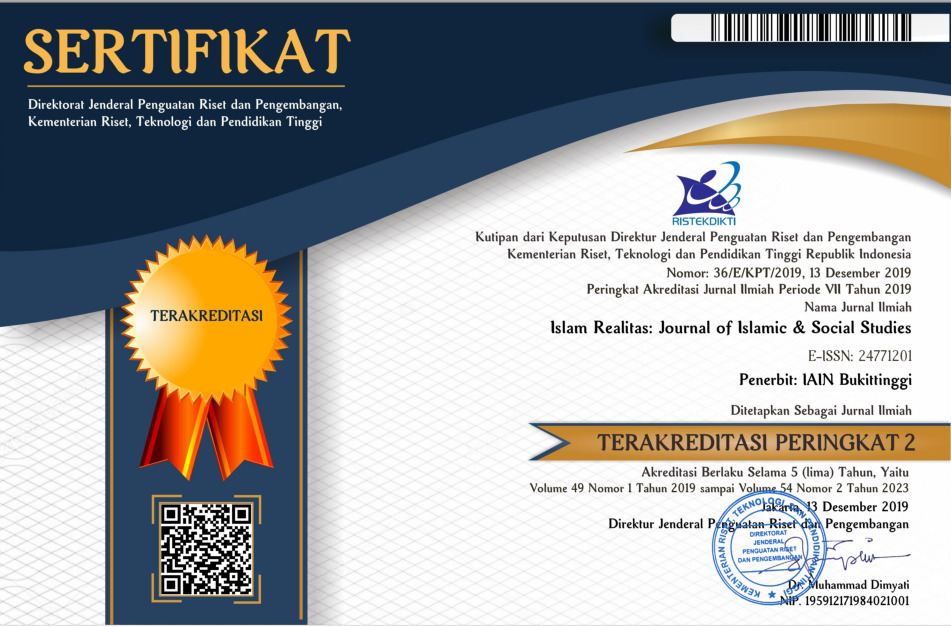Tasawuf dan Problematika Modernitas: Menimbang Maqamat dan Ahwal Abu Nashr as-Sarraj
DOI:
https://doi.org/10.30983/fuaduna.v4i1.2662Abstract
References
Abu Hanieh, Hassan. Sufism and Sufi Orders: God’s Spiritual Paths: Adaptation and Renewalin the Context of Modernization. Jordan: Friedrich-Ebert-Stiftung, 2011.
Al-Jauziyah, Ibnu Qayyim. Madarijus Salikin: Pendakian Menuju Allah Penjabaran Konkrit “Iyyaka Na’budu Wa Iyyaka Nasta’in.†Jakarta: Pustaka al-Kautsar, 2017.
al-Qusyairy, Imam. Risalah Qusyairyah: Induk Ilmu Tasawuf, Terj. Mohammad Luqman Hakiem. Surabaya: Risalah Gusti, 2014.
al-Sakandari, Ibn ’Athaillah. Terapi Makrifat Misteri Berserah Kepada Allah. Jakarta: Zaman, 2011.
Annemarie Schimmel. Mystical Dimensions of Islam. North Carolina: The University of North Carolina Press, 1975.
as-Sakandari, Syaikh Ibn ‘Atha’illah. Kitab Al-Hikam: Petuah-Petuah Agung Sang Guru, Terj. Ismail Ba’adillah. Jakarta: Khatulistiwa Press, 2012.
as-Sarraj, Abu Nashr. Al-Luma’: Rujukan Lengkap Ilmu Tasawuf. Surabaya: Risalah Gusti, 2002.
Asfari, and Otto Sukatno. Mahabbah Cinta: Mengarungi Samudera Cinta Rabi’ah Al-Adawiyah. Yogyakarta: Pustaka Hati, 2018.
Bagir, Haidar. Buku Saku Tasawuf. Bandung: Mizan, 2005.
Bahri, Media Zainul. Tasawuf Mendamaikan Dunia. Jakarta: Erlangga, 2010.
Bruinessen, Martin Van. Kitab Kuning, Pesantren, Dan Tarekat: Tradisi-Tradisi Islam Di Indonesia. Bandung: Mizan, 1995.
Dhavamony, Mariasusai. Fenomenologi Agama. Yogyakarta: Penerbit Kanisius, 1995.
Fahruddin. “Tasawuf Sebagai Upaya Membersikan Hati Guna Mencapai Kedekatan Dengan Allah.†Jurnal Pendidikan Agama Islam Ta’lim 14, no. 1 (2016): 80.
Gulen, Muhammad Fethullah. Tasawuf Untuk Kita Semua: Menapaki Bukit-Bukit Zamrud Kalbu Melalui Istilah-Istilah Dalam Praktik Sufisme. Jakarta: Republika, 2013.
Hamka. Tasawuf Modern: Bahagia Itu Dekat Dengan Kita Ada Di Dalam Diri Kita. Jakarta: Republika, 2015.
Howell, Julia Day. “Sufism and the Indonesian Islamic Revival.†The Journal of Asian Studies 60, no. 3 (2001): 701–29.
Irawan, Dedy. “Tasawuf Sebagai Solusi Krisis Manusia Modern: Analisis Pemikiran Seyyed Hossein Nasr.†Tasfiyah 3, no. 1 (February 2019): 41. https://doi.org/10.21111/tasfiyah.v3i1.2981.
Isa, Syaikh ‘Abdul Qadir. Hakekat Tasawuf. Jakarta: Qisthi Press, 2005.
Muhammad, Hasyim. Dialog Antara Tasawuf Dan Psikologi: Telaah Atas Pemikiran Psikologi Humanistik Abraham Maslow. Yogyakarta: Pustaka Pelajar, 2002.
Nata, Abuddin. Akhlak Tasawuf Dan Karakter Mulia. Jakarta: Rajawali Pers, 2013.
Owobo. 50 Komik Sufi: Cara Asyik Menyimak Kisah Hikmah, Dan Ajaran Tasawuf. Jakarta: Zaman, 2014.
Putra, Apria. “Ulama Dan Karya Tulis: Diskursus KeIslaman Di Minangkabau Awal Abad 20.†Fuaduna: Jurnal Kajian Keagamaan Dan Kemasyarakatan 1, no. 2 (2017): 134–47. https://doi.org/http://dx.doi.org/10.30983/fuaduna.v1i2.434.
Rif’i, Bahrun, and Hasan Mud’is. Filsafat Tasawuf. Bandung: CV Pustaka Setia, 2010.
Solihin, M., and Rosihon Anwar. Ilmu Tasawuf. Bandung: CV Pustaka Setia, 2008.
Syata, As-Sayid Abu Bakar Ibn Muhammad. Menapak Jejak Kaum Sufi. Surabaya: Dunia Ilmu, n.d.
Taufik, Zulfan. “The Youth and The Primacy against Religious Radicalism through the Organization of Mahasiswa Ahlith Thariqah Al Mu‘tabarah An Nahdliyyah (MATAN) in Indonesia.†TEOSOFI: Jurnal Tasawuf Dan Pemikiran Islam 9, no. 1 (June 1, 2019): 109–30. https://doi.org/10.15642/teosofi.2019.9.1.109-130.
Tohir, Moenir Nahrowi. Menjelajah Eksistensi Tasawuf Meniti Jalan Menuju Tuhan. Jakarta: PT As-Salam Sejahtera, 2012.
Trimingham, J. Spencer. The Sufi Orders in Islam. London: Oxford University Press, 1971.
Yunus, Mahmud. Kamus Arab. Jakarta: Hidakarya Agung, 1990.
Zahri, Mustafa. Kunci Memahami Ilmu Tasawuf,. Surabaya: PT Bina Ilmu, 1979.
Zamhari, Arif. “Socio-Structural Innovations in Indonesia’s Urban Sufism: The Case Study of the Majelis Dzikir and Shalawat Nurul Mustafa.†Journal of Indonesian Islam 7, no. 1 (2013): 119–44. https://doi.org/10.15642/JIIS.2013.7.1.119-144.
Zaprulkhan. Ilmu Tasawuf: Sebuah Kajian Tematik. Jakarta: Rajawali Pers, 2016.
Downloads
Published
How to Cite
Issue
Section
Citation Check
License
Authors who publish with this journal agree to the following terms:
- Authors retain copyright and grant the journal right of first publication with the work simultaneously licensed under a Creative Commons Attribution-ShareAlike 4.0. that allows others to share the work with an acknowledgment of the work's authorship and initial publication in this journal.
- Authors are able to enter into separate, additional contractual arrangements for the non-exclusive distribution of the journal's published version of the work (e.g., post it to an institutional repository or publish it in a book), with an acknowledgment of its initial publication in this journal.
- Authors are permitted and encouraged to post their work online (e.g., in institutional repositories or on their website) prior to and during the submission process, as it can lead to productive exchanges, as well as earlier and greater citation of published work (See The Effect of Open Access).





